Exploring the Cosmos: 6 Best Free Astronomy Courses to Take in 2024
Discover the secrets of the universe from the comfort of your home with the best online courses from renowned instructors and universities.
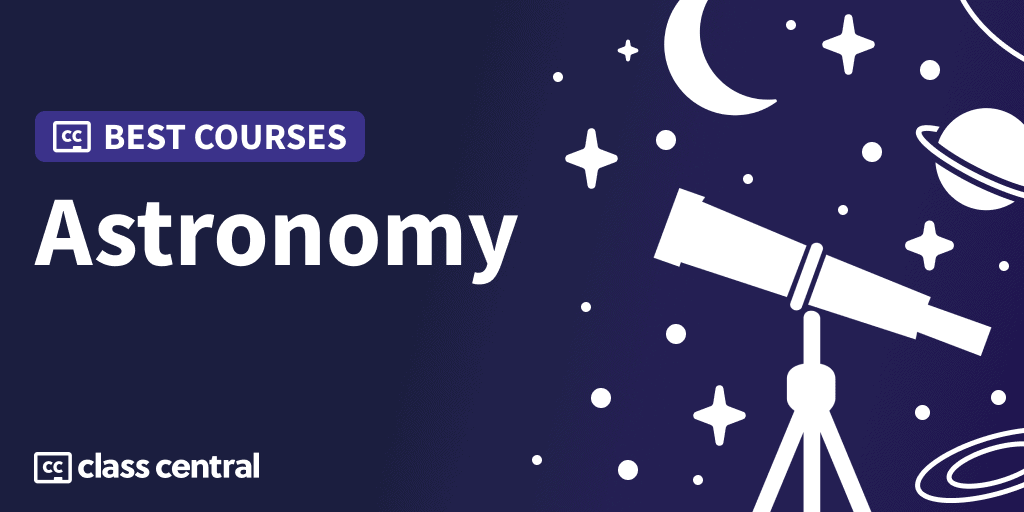
So, you’d like to learn about astronomy without enrolling in a university degree? There are hundreds of free and paid open online courses available, ranging from simply observing the sky to in-depth university-level courses delving deep into mathematics and physics. How to choose where to start?
We’ve done the work of choosing a course for you. Class Central is a search engine for online courses, with more than 200 courses in our astronomy subject. I used ratings and reviews on Class Central and provider sites to find the best open online astronomy courses.
Our top courses cover a range of sub-fields: Are you interested in star formation and the different types of stars? The planets? The possibility of extraterrestrial life? The age of the universe? We’ve got you covered!
Why You Should Trust Us
Class Central, a Tripadvisor for online education, has helped 60 million learners find their next course. We’ve been combing through online education for over a decade to aggregate a catalog of over 100,000 online courses and 200,000 reviews written by our users. And we’re online learners ourselves: combined, the Class Central team has completed over 400 online courses, including online degrees.
I’ve personally completed over 150 online courses. I’ve had a lifelong love affair with looking into the sky and trying to understand what’s out there. In 2012, the very first online course I enrolled in was in this subject and I have completed several online astronomy courses since then.
Here are our top picks:
| Course Highlight | Workload |
| Best Beginner Astronomy Course | 9 hours |
| Best Course for Kids | 3-4 hours |
| Best Course About the Solar System | 29 hours |
| Best Cosmology Course | 20-40 hours |
| Best Course About Black Holes | 18 hours |
| Best Course About Extraterrestrial Life | 11 hours |
| Honorable Mentions | NA |
How We Made Our Picks and Tested Them
Trying to find “the best” can be daunting, even for those of us who live and breathe online courses. Here’s how I approached this task.
First, I combed through Class Central’s Catalog and the internet to find a variety of free and paid open courses, some with certificates. You don’t need to enroll in a university to learn about astronomy.
I extracted information from course syllabi and reviews, and compiled their ratings, leveraging the Class Central database with its thousands of course ratings and reviews written by our users as well as course provider ratings. I watched some course videos to sample courses I hadn’t already taken.
Then, I defined the scope for these recommendations. An astronomy course can cover various topics:
- The basics: If you’ve never studied astronomy before.
- Courses for kids: It can be exciting to help a child discover the wonders of the natural world, including objects in the sky.
- Exploring Black Holes: Given the ongoing fascination with these enigmatic cosmic entities, we identified courses that explore their formation, properties, gravitational effects, and the latest research breakthroughs.
- The Search for Extraterrestrial Life: With advances in telescopes and techniques helping us discover more and more planets in the universe, it’s fascinating to ponder about the possibility of extraterrestrial life.
- The Solar System and Beyond: Closer to home, we find that the solar system includes much more than the sun and the planets.
- Cosmic Origins and Timeline: How far can we go back in time? When did the universe begin?
Ultimately, I used a combination of data and my own judgment to make these picks. I’m confident these recommendations will be a good way to start learning astronomy.
Best Beginner Astronomy Course

Astronomy by CrashCourse. Maybe you have never studied the sciences before but are curious about what you can see in the sky at night.
Dr. Phil Plait from Crash Course explains what astronomy is, and mentions its interrelationship with the other sciences, giving the example of current studies on Mars. Yes, it’s astronomy because we’re studying objects in the sky, but we are also learning plenty of geology, chemistry, physics and more along the way.
These 46 free videos have been viewed millions of times with good reason – the tone is upbeat, with plenty of animations and actual images of space objects interspersed with views of the narrator. It would also be a useful course for older children and teenagers.
The course starts with naked-eye observations and moves on to cover the solar system, stars, galaxies, and the universe itself. The course is based loosely on an introductory university-level curriculum.
By the end of the course, you’ll know what makes up the universe, how astronomers study it, and what the differences are between asteroids, comets, and meteors. You’ll also be able to relate things you observe to scientific theories about space and its history.
The course concludes with a 360-degree interactive tour of the solar system. Here’s an in-depth review.
| Level | Beginner |
| Instructor | Phil Plait |
| Time Commitment | 9 Hours |
| Cost | Free |
| Quizzes/Assessment Items | No |
| Certificate | No |
Best Course for Kids
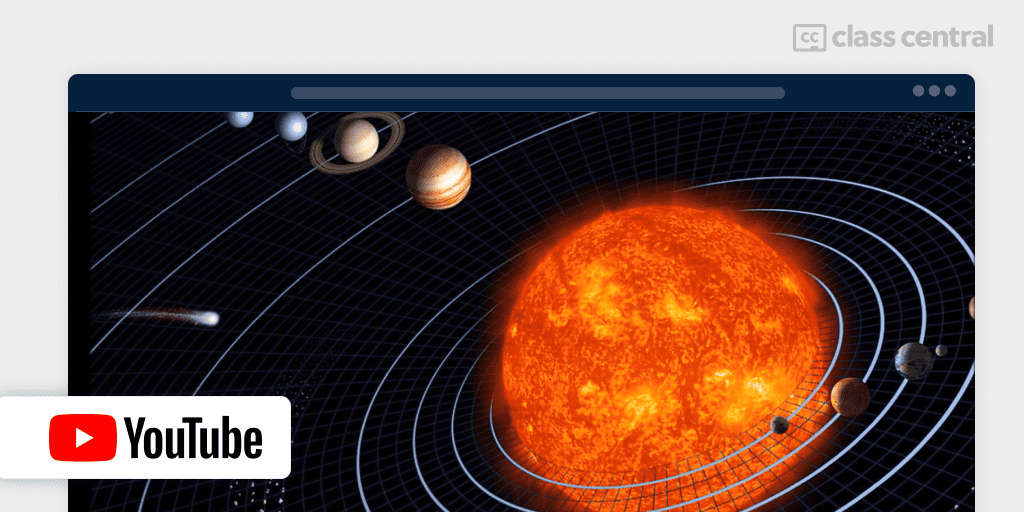
Free School’s Astronomy and Space for Children has plenty of images of real astronomical objects as well as animations. As a child, I would have simply loved this course.
You can find videos about planets, such as Jupiter, Mars, Saturn, and even dwarf planets including Ceres and Pluto. There are also videos about the Moon and its phases, the Sun, and the auroras. Kids can also learn about constellations including Orion, Cassiopeia, Scorpius, Taurus, and Leo. These videos teach children about the mythology and how to locate these constellations in the night sky.
The series also covers topics like eclipses, black holes, and the Hubble Space Telescope. Kids can learn about cosmic clouds and nebulae, and see incredible images captured by the telescope.
The narration is in child-friendly language, but doesn’t talk down to the audience. It’s also interesting for adults with no prior knowledge of astronomy.
| Level | Beginner |
| Instructor | FreeSchool |
| Time Commitment | 3-4 Hours |
| Cost | Free |
| Quizzes/Assessment Items | No |
| Certificate | No |
Best Course About the Solar System
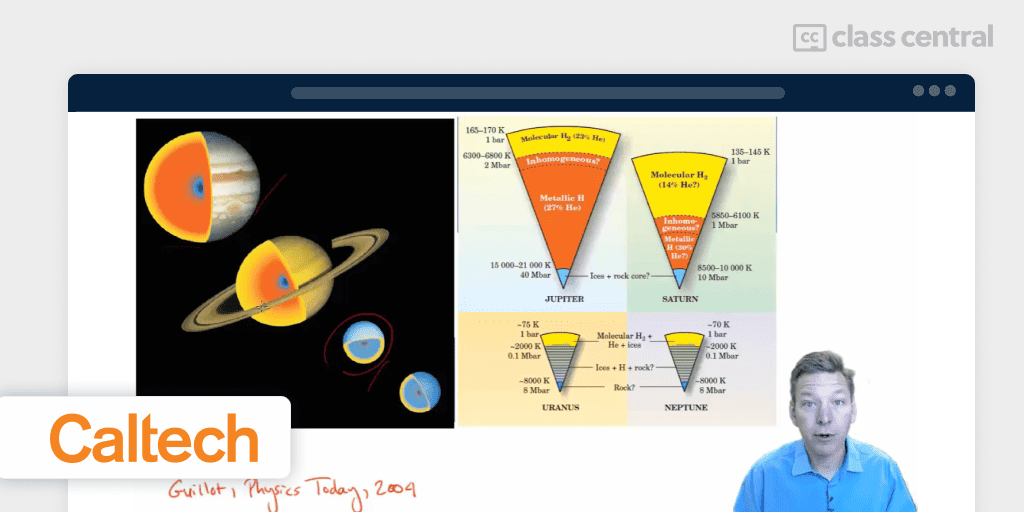
The Science of the Solar System. I couldn’t leave this excellent, highly-rated course out of the list! Although some scientific and mathematical knowledge is helpful for this university-level Caltech course, you can get plenty out of it even if you gloss over tricky details. You’ll start with a detailed examination of Mars that also serves as a general introduction to many of the concepts explored in later units. The giant planets are then placed under the spotlight, followed by the many small bodies found in the solar system. The final unit of the course explores the possibility of extraterrestrial life and the conditions needed for life. Which means you’ve learned some chemistry, geology, and biology alongside the physics and mathematics that you’d expect in an astronomy course. The quizzes and final exam aren’t just about memorizing facts, they want you to really think about what you’ve learned. It might be a challenge, but it’ll be worth it. It’s featured in several editions of Class Central’s Best Online Courses of All Time list.
And check out my detailed review of this course.
| Instructor | Mike Brown |
| Time Commitment | 10 weeks |
| Cost | Free |
| Quizzes/Assessment Items | Yes, free access |
| Certificate | Paid |
Best Cosmology Course
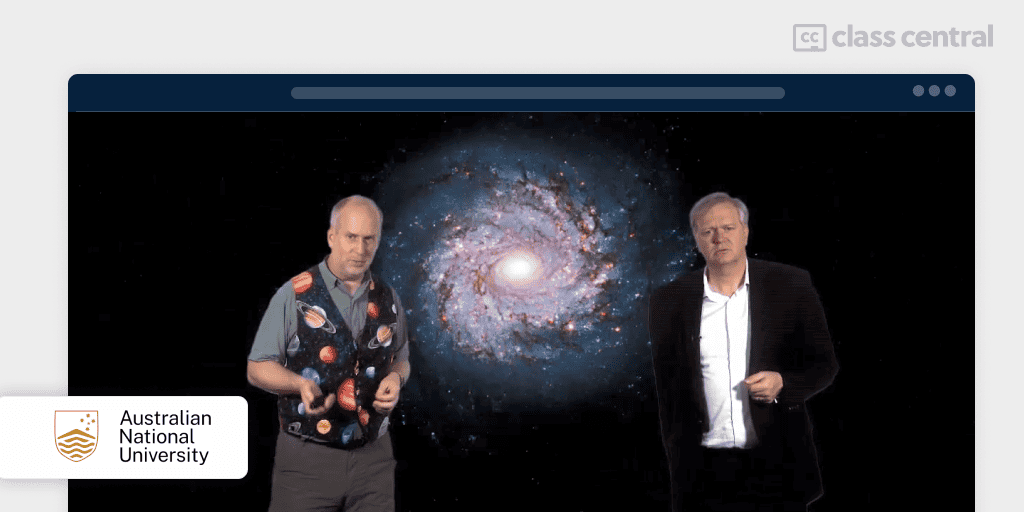
Astrophysics: Cosmology is all about the universe. Where it came from, how it will end, and what space and time are all about. You’ll learn about recent discoveries that have answered some of these questions, but there’s still a lot we don’t know. Guest speakers including Lawrence Krauss and Brian Cox will help explore these mysteries. This course is for people who want to know more about astronomy than just what’s in magazines or on TV. You’ll need some high-school level math and physics to really get it. This is one of four courses that make up ANUx’s first-year astrophysics program (Astrophysics XSeries on edX), that you can take in any order you want.
| Level | Intermediate |
| Instructor | Paul Francis and Brian Schmidt |
| Time Commitment | 10 weeks |
| Cost | Free audit |
| Quizzes/Assessment Items | Yes, behind paywall |
| Certificate | Paid |
Best Course About Black Holes
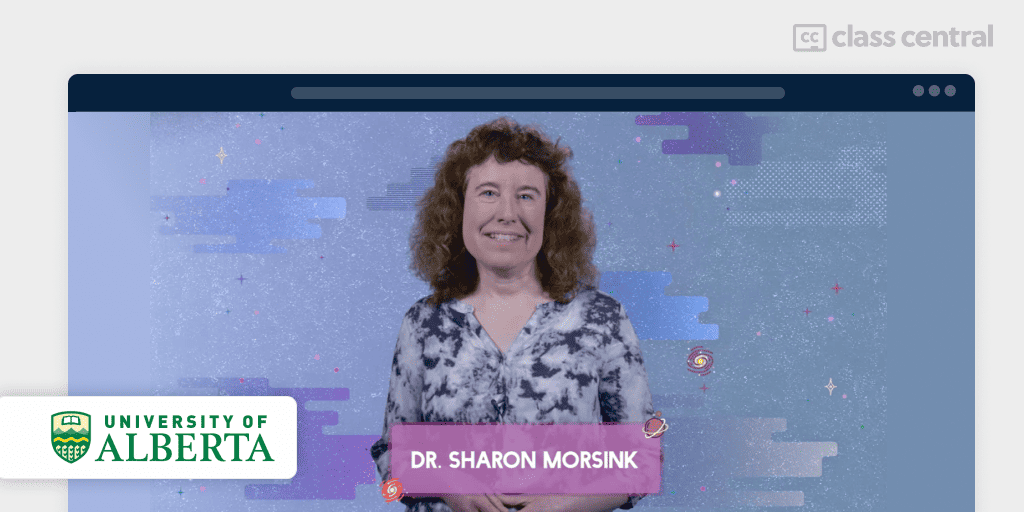
In May 2022, the world was mesmerized by the first images of the black hole at the center of our own Milky Way galaxy. Astro 101: Black Holes from the University of Alberta delves into the mysteries of black holes. You’ll find out what black holes are, how they’re formed, and how they relate to stars. You’ll also learn about what happens if you fall into one and how they can be detected even though they don’t emit light. You will explore if a particle accelerator could create a black hole and if black holes could be wormholes or time machines. Along the way, you’ll learn about astronomy, relativity, and quantum physics. By the end of the course, you’ll be able to explain black hole research, different types of black holes, how they form, how they can be detected, and the puzzles facing black hole researchers.
| Level | Beginner |
| Instructor | Sharon Morsink |
| Time Commitment | 10 weeks |
| Cost | Free |
| Quizzes/Assessment Items | Yes, free access |
| Certificate | Paid |
Best Course About Extraterrestrial Life
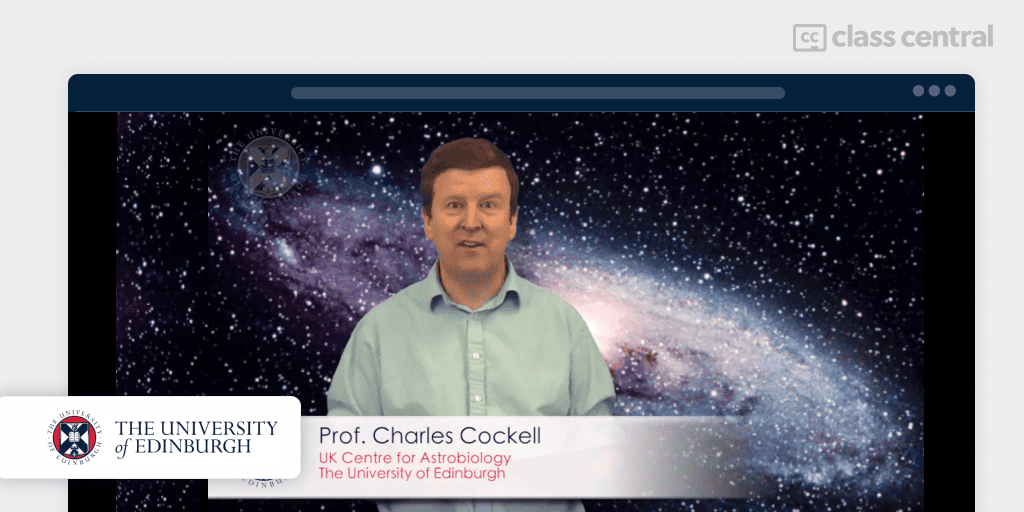
Astrobiology and the Search for Extraterrestrial Life from the University of Edinburgh. This course is a great example of how the sciences intermesh. Although it’s classified as an astronomy course, this course is about life. It introduces concepts found in biology, geology, and other scientific disciplines. You’ll start by looking at the definition of life and how it originated on Earth, including what the environment was like back then. Then you’ll explore how life has adapted to extreme environments and evolved over time. You’ll also examine the chances of finding life on other planets or moons in our solar system and beyond, and how we would go about detecting it. And finally, you’ll ponder what it would mean if we were to make contact with intelligent extraterrestrial life. So if you’re curious about the mysteries of life in the universe, this course is for you.
| Instructor | Charles Cockell |
| Time Commitment | 5 weeks |
| Cost | Free |
| Quizzes/Assessment Items | Yes, free access |
| Certificate | Paid |
Honorable Mentions
Astronomy: Exploring Time and Space from the University of Arizona: listed in Class Central’s Best Online Courses of All Time, this introductory-level course is designed for anyone interested in learning more about modern astronomy and recent astronomical discoveries, even if you don’t have a science background.
Archeoastronomy from Politecnico di Milano will teach you an interdisciplinary science that explores the links between ancient monuments and the sky, with a focus on solstices and equinoxes at famous places like Stonehenge, Giza, and Machu Picchu. Plus, you’ll get an introduction to how naked-eye astronomy was used in ancient religions and power structures.
From the Big Bang to Dark Energy from the University of Tokyo: this course discusses recent discoveries about the evolution of the universe, including the prevalence of dark matter, the discovery of the Higgs-boson, the mystery of how ordinary matter survived against anti-matter, the acceleration of the universe’s expansion due to dark energy, and what we may learn from ongoing research.
AstroTech: The Science and Technology behind Astronomical Discovery from the University of Edinburgh: astronomy would be impossible without technology, and every advance in astronomy is due to advances in technology. Each week you will learn about a different aspect of astronomical technology, how it works, how astronomical data is collected, the results, and a discussion of what the future may hold.
Moons from The Open University: this highly-rated course is not available as I write, but you can ask FutureLearn to advise you when enrollments are open again. No prior knowledge of astronomy is required to explore the vast diversity of moons in our Solar System, with their range in size, composition, and potential for hosting life.
Stellarium
And if you just want to know the names of things you can see in the sky or where to find a particular object, a free download of Stellarium may be all that you need. This amazing software lets you choose your position on the earth and move through time to see what’s in the sky now, in the past, and the future.







David Downie
Hi. I’m interested in the 9hrs Beginners classes.
I live on the Gold Coast, Australia. Please send me details
Fabio Dantas
You can watch it on our website: https://www.classcentral.com/classroom/youtube-astronomy-45837
Or YouTube: https://www.youtube.com/playlist?list=PL8dPuuaLjXtPAJr1ysd5yGIyiSFuh0mIL